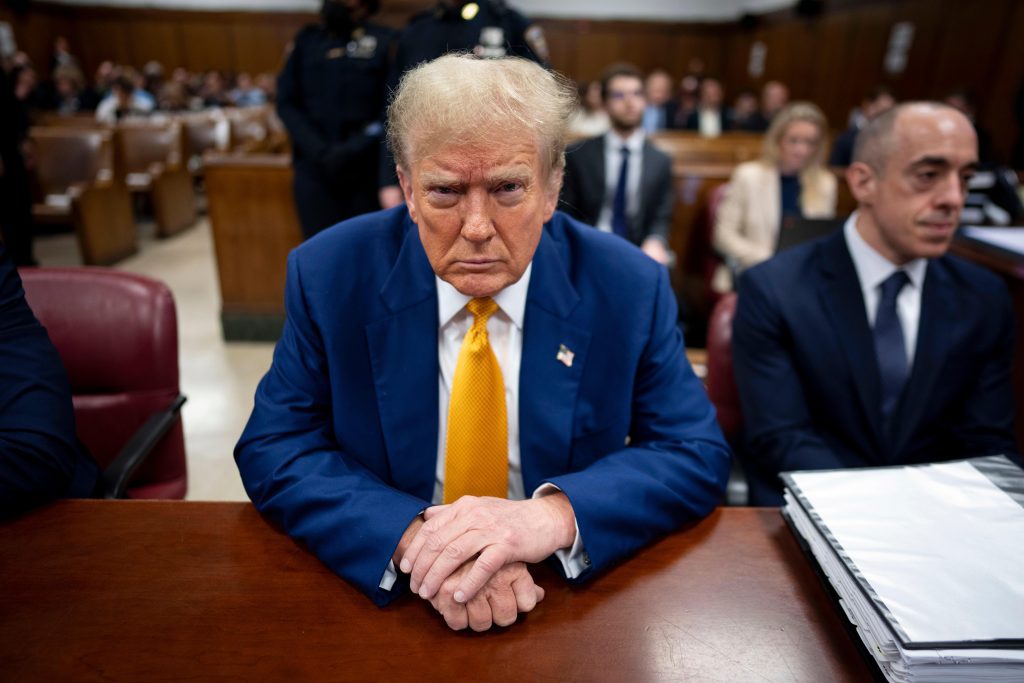By MICHAEL R. SISAK, JAKE OFFENHARTZ, PHILIP MARCELO and ALANNA DURKIN RICHER (Associated Press)
NEW YORK (AP) — Hope HicksAt the trial regarding former president's hush money, Hicks testified about the 2016 campaign getting caught in a political storm due to a recording of him bragging about groping women without their consent.
Hicks, who was the White House communications director, is the first close Trump adviser to give evidence in the case. This case accuses the former president of an illegal scheme to influence the 2016 election by silencing women who claimed to have had sexual encounters with him.
Prosecutors argue that the well-known “Access Hollywood” tape, which surfaced just before a debate, shook up Trump’s campaign and sped up his then-lawyer Michael Cohen’s hush money agreement with porn actress Stormy Daniels to prevent her from talking about her alleged sexual encounter with Trump years earlier.
Hicks expressed being deeply worried after finding out about the tape from a Washington Post journalist asking for her response. She discussed the transcript of the tape with Trump and other advisers, she said during her testimony.
“I had a strong feeling that this was going to be a huge story and it would dominate the news for several days,” Hicks stated. “This was a damaging development.”
Trump has denied the claims of extramarital sexual encounters. The expected Republican presidential nominee for this year denies any wrongdoing in this case.
Hicks, who is testifying for the prosecution under a subpoena, confessed that she was “really nervous” when taking the stand. Referring to her former boss as “Mr. Trump,” she informed the court that she last talked to him in the summer or fall of 2022.
Although no longer a part of Trump’s closest advisers, Hicks shared positive comments about the former president when asked about her background. Hicks praised Trump multiple times at the start of her testimony, describing him as a “very good at multitasking, a very hard worker.”
Hicks acted as Trump’s 2016 campaign press secretary and was among a small group of early campaign staff who joined his administration.
Former Trump lawyer and fixer Michael Cohen, the main witness for the prosecution, is yet to testify in the hush money trial. However, jurors have already been presented with Cohen’s statements as prosecutors directly aim to connect Trump to payments made to silence women with damaging allegations about him before the 2016 election.
The second week of testimony in the case will conclude on Friday, a day after jurors heard a potentially vital piece of evidence: a recording of Trump and Cohen discussing a plan to pay off an ex-Playboy model who claimed to have had a relationship with Trump. The former president denies the relationship.
Prosecutors have spent the week using detailed testimony about meetings, email exchanges, business transactions and bank accounts to strengthen their case accusing Trump of plan to unlawfully influence the election. They are preparing for important testimony from Cohen, who gave Daniels $130,000 to keep quiet before he was sent to prison for the secret payment plan.
Trump’s defense has tried to find flaws in the trustworthiness of prosecution witnesses and demonstrate that Trump was trying to protect his reputation and family — not his campaign — by keeping the women silent. The defense also suggested, while questioning a lawyer who represented two women in hush money negotiations, that Trump was actually the target of extortion.
The recording played Thursday was covertly made by Cohen shortly before the 2016 election. Cohen is heard informing Trump about a scheme to buy the rights to former Playboy model Karen McDougal’s story from the National Enquirer so that it would never be revealed. The tabloid had previously acquired McDougal’s story to suppress it on Trump’s behalf.
In the recording, Cohen revealed that he had discussed with then-Trump Organization Chief Financial Officer Allen Weisselberg about “how to set the whole thing up with funding.”
Trump can be heard responding: “What do we have to pay for this? One-fifty?”
Trump suggested the payment be made with cash, leading Cohen to object by repeatedly saying “no.” Trump then says “check” before the recording cuts off.
Prosecutors played the recording after summoning Douglas Daus, a forensic analyst from the Manhattan district attorney’s office who conducted analyses on iPhones Cohen handed over to authorities during the investigation. Daus returned to the stand Friday morning.
Jurors also heard over six hours of critical testimony this week from Keith Davidson, a lawyer who represented McDougal and Daniels in their negotiations with Cohen and the National Enquirer — the tabloid that bought and suppressed negative stories in an industry practice known as “catch and kill.” Davidson on Thursday described being shocked that his behind-the-scenes efforts might have contributed to Trump winning the 2016 election.
“What have we done?” Davidson messaged the then-editor of the National Enquirer on election night when it became clear that Trump was going to win. “Oh my god,” the tabloid editor responded.
“There was an understanding that our efforts may have in some way — strike that — our activities may have in some way assisted the presidential campaign of Donald Trump,” Davidson told jurors.
Trump’s lawyers tried to lessen the potential damage of Davidson’s testimony by getting him to admit that he never had any interactions with Trump — only Cohen. In fact, Davidson said, he had never been in the same room as Trump until his testimony.
“I had no personal interactions with Donald Trump. It either came from my clients, Mr. Cohen or some other source, but certainly not him,” Davidson said.
Trump is accused of 34 counts of falsifying internal Trump Organization business records. The charges stem from paperwork such as invoices and checks that were considered legal expenses in Trump Organization records. Prosecutors say they were actually reimbursements to Cohen for the $130,000 hush money payment to Daniels.









